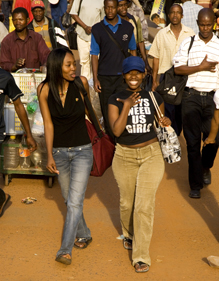
While this can make being a youngster in the country extremely challenging, it also presents an opportunity. Now more than ever, youth need to actively unite against corruption, speak out and hold leaders accountable so that corruption in the country becomes the exception and not the norm.
Today young South Africans live in the 69th most corrupt country in the world, according to Transparency International’s recently released 2012 Corruption Perceptions Index. The country has slipped back five places from a more favourable ranking of 64 in 2011. In the most recent index, Denmark is in first position for the country perceived to be the least corrupt, while Somalia is perceived as the most corrupt out of 176 countries surveyed.
Nine faces speak for all
Ahead of the UN World Anti-Corruption Day on 9 December, Corruption Watch has joined forces with YFM to profile nine individual stories from nine young people who experience corruption in their daily lives. Watch the video here.
From corrupt driving instructors who demand bribes to pass their students, to officials in learnership programmes who expect sexual favours from female applicants, the young people’s message is clear in the video, the buck stops with the ministers in charge of these services, so it is they who must be accountable!
Bongani Xwezi is a community fieldworker for advocacy group Right2Know, and his message is to Minister of Human Settlements Tokyo Sexwale: “Contractors who were hired by government to build our RDP houses use cheap material, less cement than required, as a result there are cracks in the walls.”
A young lawyer for NGO Section 27 Niki Stein takes on Basic Education Minister Angie Motshekga, citing the major delay in getting textbooks to Limpopo schools as an example of the education crisis. The delay, says Stein, was caused when the department entered into an irregular contract with a service provider who did not deliver.
“What will be done to address the underlying education crisis?” she asks.
This meltdown, as highlighted by Section27, will continue to make school pupils vulnerable to corruption in the form of contractor-government relationships that are not above board.
According the recent census results released by Statistics South Africa, only 28% of South Africans over the age of 20 have completed their matric. The longer youngsters remain inadequately educated, the less likely they are to become fully aware of their Constitutional rights, and the more likely they will remain victims of corruption.
Young South Africans count because …
The census results also reveal that just close to 70% of the country’s population is between the ages of 15 and 64. Not all in this age bracket qualify as youth, but its activities, perceptions and outlook pretty much define the direction of the rest of the country.
With the surge in popularity of social media, young people have also become equipped with an opportunity to question the status quo and advocate for a better society.
The South African Social Media Landscape 2012 study shows astounding growth in the use of social media by South Africa’s urban youth, with an average of 100 000 new people joining Twitter every month between the period August 2011 and October 2012, while WhatsApp now has a user base of 4.6-million people over the age of 16.
The findings of the study, conducted by World Wide Worx and Fuseware, were released in October 2012.
The figures go on to show that young people use social media to voice their opinions and engage each other on topics that closely affect them. They are able to connect with others who share their interests, and are also inclined to comment on current affairs issues that are of concern to them.
Tahir Sema, who also took part in Corruption Watch’s nine faces campaign, calls on government officials to answer to taxpayers. As a spokesperson for the South African Municipal Workers Association, Sema believes the local government sector is a corruption hotspot where accountability levels are low. Sema challenges Minister of Local Government Richard Baloyi to tackle a lack of accountability in the sector.
Corruption Watch needs you
Corruption Watch wants to spur as much advocacy action among young people as possible. Whether young people participate as individuals or as groups, their collective voice counts. As the nine voices video shows, youngsters are already demonstrating that they can take government leaders to task.
Have you offered to pay a bribe to get a service done? Have you been asked to bribe to get an official to speed up a service or get you out of trouble’?
Use email, your phone, Facebook or Twitter to send us your experiences and connect with others like you. United, youth can be the positive change towards a corruption-free South Africa.

